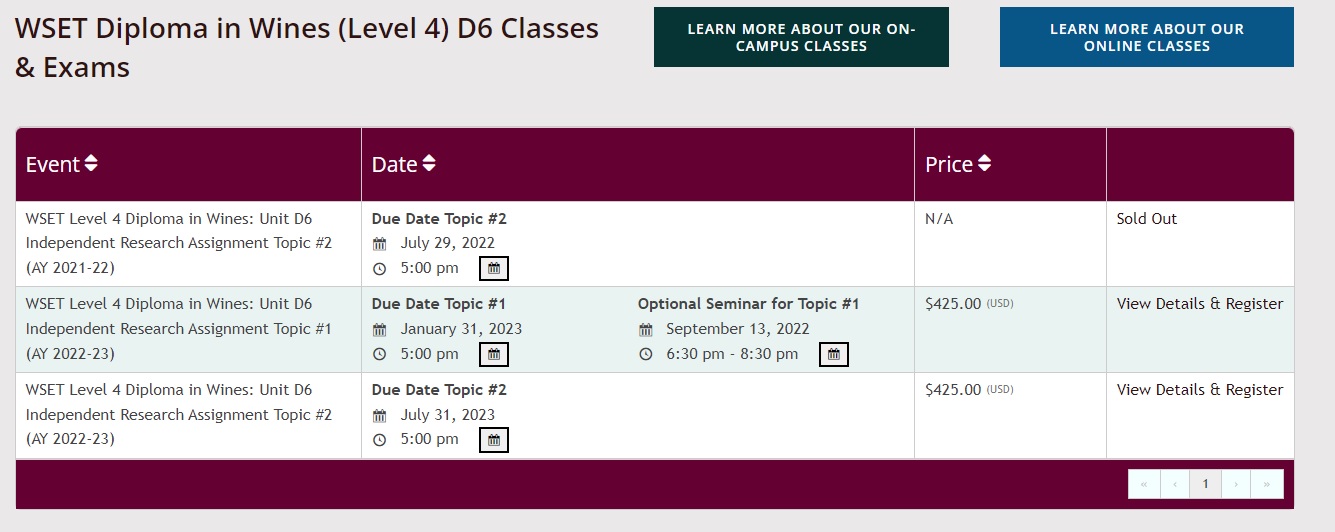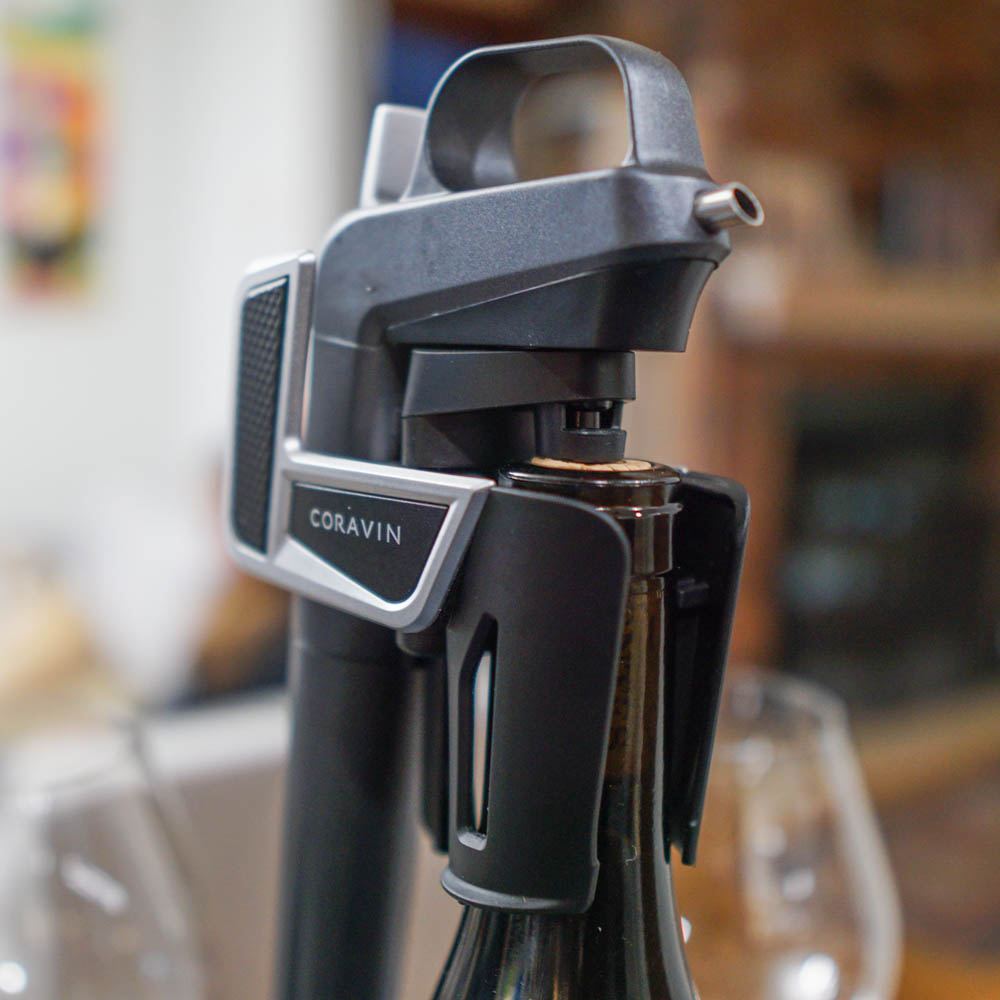Published by Jeremy.
Disclaimers: We use demographic data, email opt-ins, display advertising, and affiliate links to operate this site. Please review our Terms and Conditions for more information. This website is intended for those of legal drinking age in your jurisdiction.
If there was any module in WSET Diploma that I was not terribly worried about, it was D6- the research paper.
The reason for this is mostly due to my background. As a chemical engineer, I have crafted many scientific-oriented research papers over the years. Going further, as a full-time blogger, writing 3,000 words is all in a day's work (some days multiple times over). To put it bluntly, I like to write, and my D6 paper felt like my time to shine based on these skillsets.
So while I generally felt like this module was the most approachable (anything beats a 60 or 90-minute exam where you have to answer obscure questions under pressure), I also recognize that I am in a fortunate position to make such a statement outright.
Unfortunately, in this one, I cannot tell you how to write a research paper. I cannot tell you where to find sources for your specific topic out of respect for the program. The conventional study logic that I like to share in other WSET Diploma modules really doesn't apply here since you aren't actually studying as you would for an exam. As such, we're going to look at D6 a little differently with information on how to find paper topics to begin with and common reasons why students lose points on what should be an otherwise easy pass.
Note: I was enrolled in the July 2022 WSET D6 paper topic. Paper structure and topics can and do change. I passed D6 with merit.
How to Find the WSET Diploma D6 Topics
To start, you may find it interesting to know that you can see the paper topics before you register- if your timing is right at least. As such, if you have some flexibility when you want to work on the WSET D6 research paper, you can be a bit strategic in getting a paper topic that may match your interests or educational background.
Once you are enrolled for WSET Diploma, you are given access to resources for all six modules, whether enrolled in them or not. So after you sign up for D1 and get online access you can really scroll through materials to your heart's content be it for digital copies of the books (D1-D5), seeing wines given in past tasting exams (D3-D5), evaluator feedback reports for all modules (D1-D6), and even see research paper (D6) prompts for the current calendar year as well.
As such, depending on the time you are looking for paper topics, you may be able to see prompts for one if not two upcoming sessions- a true luxury if you are flexible on when to take D6.
Generally speaking, new prompts for D6 are released by August 1st (the start of a WSET calendar year), and there are two paper topics available- one due at the end of January and one due at the end of July the following year. When I registered for my paper in December 2021, I could see the paper topics due for January 2022 and July 2022 as a result (plus the previous topic that was due July 2021- although in August 2022 I could only see the upcoming topics).
While this cannot be guaranteed to stay the same every year, it was fascinating to look at to see what kind of paper topics were out there in advance. I had little interest in two of the three topics that I could see in the online portal, and the third was so close to my educational background and work history that I would've been crazy not to sign up for it. Not being one to turn away a gift like that, I signed up right away despite it not being ideal for my schedule.
So if you have some flexibility on when you want to take your research paper, keeping an eye on topics in advance, particularly around August for the upcoming year, can help you find one that is more in line with your interests. This will put you in a stronger position than if you signed up for a module for the submission dates alone.

Since you have access to the topics ahead of time, and this project is completely independent without a corresponding course, the “start” date for D6 is also a bit blurry. You really can begin your paper whenever you want, insofar as you register before your school closes for bookings- which for mine was about two weeks before the due date (this likely varies by school, so don't procrastinate).
It is also worth reiterating that WSET requires students to finish D1 before moving on to other modules, and it is highly recommended to have finished D2 before your paper is due, too. Odds are good you'll be referencing the material from these modules for virtually any topic they may assign. So don't get ahead of yourself with D6!
Logic to Consider for the WSET Diploma D6 Essay
One of the perks to the WSET D6 paper is that the program provides pretty clear instructions on what they're looking for in the final product, down to word count and citation requirements. They really aren't trying to trick you here. Follow the rules, answer the questions as asked, and format your paper properly and you shouldn't have any issues passing. The only real risk is that students often forget these when writing and editing and lose points needlessly.
So first up, we should talk about the scoring aspect as this will dictate virtually everything you do on your paper outright.
The score breakdown for the D6 paper is no different than most essay exams- you need 55% to pass, and the prompt is based on a 100% scale. For my paper, I received three questions totaling 85% (one weighted significantly more than the other two) and 15% for formatting and general paper construction (spelling, grammar, citations, varied use of examples, varied source types, etc.).
You may ask why nearly a third of the way to a passing score is purely formatting, and that is simply because WSET is looking for a proper research paper, complete with graphs, figures, and citations, and students somehow miss this point again, and again, and again. As such, you will do well to read their formatting and citation guidelines, fit within the required word count (mine had +/- 10% tolerance- or 2,700 to 3,300 words), and ensure you do not do anything to needlessly lose out on 15% that should otherwise be free points. Will you get all 15%? Probably not. But it'd be dumb to skip over them all the same.
My school also offered a one-night seminar early in the module to have students ask questions about D6 requirements and our paper topic at large. While I cannot guarantee that every school offers a session of this nature, I did walk away with some key points that I think are worth highlighting in greater detail.
Disclaimer: The below topics were shared with my “class” via instructors and/or are found in public evaluator reports published by WSET. I am purposefully not sharing the process of how I researched my own paper because that method is on you. So if you've read the guidelines (and have taken WSET essay exams in the past), none of this logic should be new- it is simply stressing their importance once more.
First, students often lose points simply because they do not answer the question as asked. You should be used to this point if you've ever taken a WSET essay test- it comes up in evaluator reports on every exam. Many questions for these exams have context clues baked in. If you receive a question about activities in the vineyard, but only talk about winery activities, you may not receive any points because you didn't actually answer the question as asked. If you are asked to give example(s), plural, and only cite one example, you are likely going to lose points as well.
It really is that simple (and literal).
This extends to the question style as well. A question starting with “Evaluate” is looking for a completely different style of response to one starting with “Define” or “Explain”. Once again, if you've taken D1 and D2 at a minimum you should be familiar with what WSET expects for questions starting with words like these. The specifications are explicitly clear on expectations.
Likewise, you cannot assume that a paper reviewer knows anything that is left unsaid or casually implied. Yes, they probably know the topic better than you (and then some), but it is better to assume they know nothing as ambiguity can lose you points. Being overt is sometimes simply necessary just to show that you are, in fact, answering the question as asked. So after you finish your first draft, read through and ask yourself “did I actually answer the question as asked?” You'll be shocked at what you find- I was.
Second, much like with the essay tests, the points allocated to each question should be a guide on how much you write based on your total word count. If you only allocate 10% of your paper to a 50% question, I would not be shocked if you only receive 10% of the points. Length is not indicative of quality in research papers, of course, but the bigger the points allocation, the more the reviewers likely want to see in the body of your text. You're going to get sick of me saying this, but this is, once again, no different than what is expected in other WSET exams.
You may also want to take a pass through your paper, count the individual “points” you made, and compare it to the total point figure. If a reviewer can give you 50 unique checks within a 50% question, you should feel pretty comfortable that you answered the question in enough detail to get a passing grade. If you only count 10 “points” and the rest is fluff that doesn't help you answer the question, you likely have problems.
Third, keep in mind this is a proper research paper. This means crafting a narrative that links the questions together, using citations from reputable sources to make your points, using cited facts to draw conclusions (and not the other way around), and formatting like a proper research paper (shocking, I know). Simply answering the questions in order as “Question 1: [text]”, “Question 2: [text]”, Question 3: [text]” a la other WSET exams does not magically make it a research paper.
Does this clash with the recommendation of being overt above? Perhaps. But now we're talking about the art of crafting a good paper, and that is heavily subjective.
On the citation side, there is also a line on what media can be considered a trusted source versus not, so you run a risk if you stray too far out there. To put it bluntly, I don't want to have someone from WSET emailing me saying a student used our opinion-based blog as a source. We may have built some credibility in the wine world, but not for a technical research paper. Please don't.
Fourth, WSET loves graphs and tables. Our instructor from the mini-session made it seem like including copies of existing tables and graphs is fine (you don't necessarily have to make your own based on external data), but as always you need to give credit in the form of a citation. How many graphs and figures fit into your paper really will depend on the topic.
Fifth, it should go without saying that colluding with other students is bad and may be viewed as plagiarism. Don't share resources or talk about what you're writing about with anyone enrolled in your topic. Studying together for other modules is fine. It is not here. Just don't even entertain the idea at all. The last thing you would want is your paper to be thrown out completely purely because your paper overlaps too much with another student.
If there is a reason why I am only sharing clarification remarks and not my exact process for my research paper, it is this point right here. This one is all you.
Sixth, read the submission guidelines carefully. There is a short, but clearly defined process to submitting your paper that must be followed. Read it word for word, several times over, once more before you package your paper, and once more right before you drop it off for good measure. WSET is very clear in what they are looking for, but if you are in a rush you may forget something dumb, like signing your cover sheet, and risk having your paper not graded outright.
Finally, and perhaps most importantly, the WSET Diploma online portal has examiner reports from previous exams, from every module, including D6. This is incredibly valuable to review as previous research assignment questions could have very similar word choices to your paper despite being a different broad topic. Even better is that one paragraph down you may find commentary from evaluators on what they wanted to see and common mistakes that were made by students.
Why yes I am not going to make those mistakes, and thank you very much for those free points.
Overall, the WSET D6 paper doesn't have to be as daunting as you may think it is. The program does a good job of spelling out the requirements. You can get close to a passing score simply by following the formatting requirements, answering the questions as asked, and constructing a formal research paper outright. It still requires a lot of time (I think I spent somewhere between 60-80 hours on my paper), but they give you a really good pathway to working on this one all the same- insofar as you actually pay attention to the rules.
Throw in the fact that you may be able to be a bit strategic in signing up for a paper that aligns with your interests or education, and you will be well on your way to a pass if not merit or distinction!
What do you think of WSET Diploma D6? Comment below to share your thoughts!
Upgrade Your Home Wine Bar
Need to upgrade your wine bar? Grab some new wine accessories:





